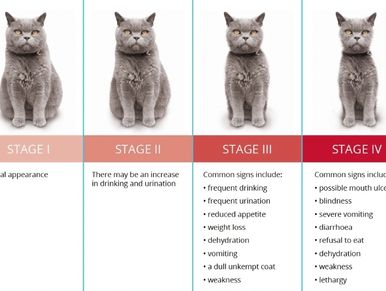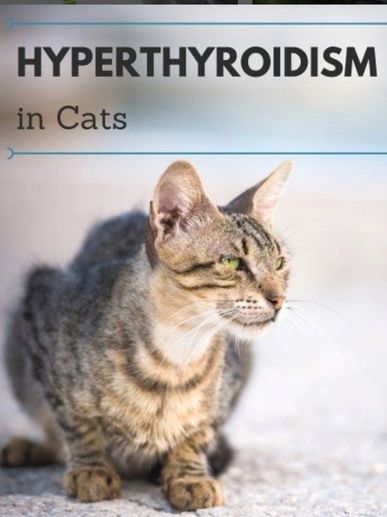Common illnesses in cats
How to tell if my cat is in pain

Signs of pain include any of the following:
becoming less tolerant of people
becoming more withdrawn or hiding more than usual
sleeping more than usual, or slowing down
becoming more reluctant or hesitant in jumping down from furniture or going through the cat flap
being stiff after resting, or using a particular leg when going up and down stairs
crouching in a hunched up position with squinty eyes
reduced eating or drinking
increased anxiety or fear
sleep disturbance
pacing, circling or restlessness
a scruffy or matted coat
vocalisation, especially when moving or using the litter tray
over-grooming
some cats will purr in pain
Signs of pain include any of the following:
becoming less tolerant of people
becoming more withdrawn or hiding more than usual
sleeping more than usual, or slowing down
becoming more reluctant or hesitant in jumping down from furniture or going through the cat flap
being stiff after resting, or using a particular leg when going up and down stairs
crouching in a hunched up position with squinty eyes
reduced eating or drinking
increased anxiety or fear
sleep disturbance
pacing, circling or restlessness
a scruffy or matted coat
vocalisation, especially when moving or using the litter tray
over-grooming
some cats will purr in pain
Kidney disease

Kidney disease is common in older cats, and most often, the signs that are initially noticed include increased water consumption, increased urination, and weight loss. Other signs may include increased vomiting, foul breath, and decreased appetite.
It is important to have blood screens done on your older cat at regular intervals to check kidney function values because, by the time most cats show recognizable signs of illness, 75% of their kidney function is already irretrievably gone.
Upper respiratory infection

Upper respiratory infections (URI) are fairly common in cats, especially kittens. Calicivirus and herpesvirus account for the majority of URI cases in cats. Affected cats may sneeze, cough, wheeze, have discharge from the eyes and nose, and sometimes have a decreased appetite.
If your kitten or cat is showing any of the signs listed above, it's important to have them checked out by a veterinarian because there are times when a secondary bacterial infection needs to be treated. Dehydration may also need to be addressed, and other causes of coughs need to be ruled out
Hypothyroidism

Hyperthyroidism is diagnosed quite frequently in older cats. The exact cause of this illness, which was first described in the 1970s and has increased in incidence since then, is still being heavily.
researched. Hyperthyroidism in cats results in an increased metabolism, and the signs commonly associated with it include increased appetite, weight loss, increased heart rate, irritability or hyperactivity, and sometimes increased vomiting.
There are three main ways to treat hyperthyroidism: medication, surgery, and radioactive iodine therapy. Which treatment is chosen depends on individual circumstances and concurrent illnesses.
Diabetes mellitus

Diabetes mellitus is a serious condition in cats, and it is diagnosed fairly commonly. Its signs include increased water consumption, increased urination, weight loss, and increased appetite. Feline diabetes is serious, and it becomes life-threatening if it is not recognized and treated. Keeping your cat at a healthy weight is one way to decrease his risk of developing diabetes mellitus.
Lower urnary track diseas

Lower urinary tract disease, or abnormal conditions of the bladder and urethra, is extremely common in cats. These issues can result in inappropriate urination and life-threatening urinary tract blockage, especially in male cats.
If your cat begins urinating outside of the litter box, appears to be straining to urinate, is making frequent trips to the litter box but only producing small amounts of urine, is crying while attempting to urinate, or has visible blood in the urine, you need to get him to the veterinarian right away. In fact, crying while attempting to urinate, trips in and out of the litter box, and straining to urinate are all signs of urinary blockage in male cats, which is an emergency situation.
Gastrointestinal problems
Gastrointestinal problems
Gastrointestinal problems

Gastrointestinal problems are commonly diagnosed and cats, and may include any of the following:
Countless conditions can cause gastrointestinal problems in cats, including intestinal parasites, irritable bowel syndrome, megacolon, food allergy or sensitivity, and the list goes on. Any change in your cat's litter box habits, appetite, or frequency of vomiting warrants a visit to the veterinarian.
This website uses cookies.
We use cookies to analyze website traffic and optimize your website experience. By accepting our use of cookies, your data will be aggregated with all other user data.